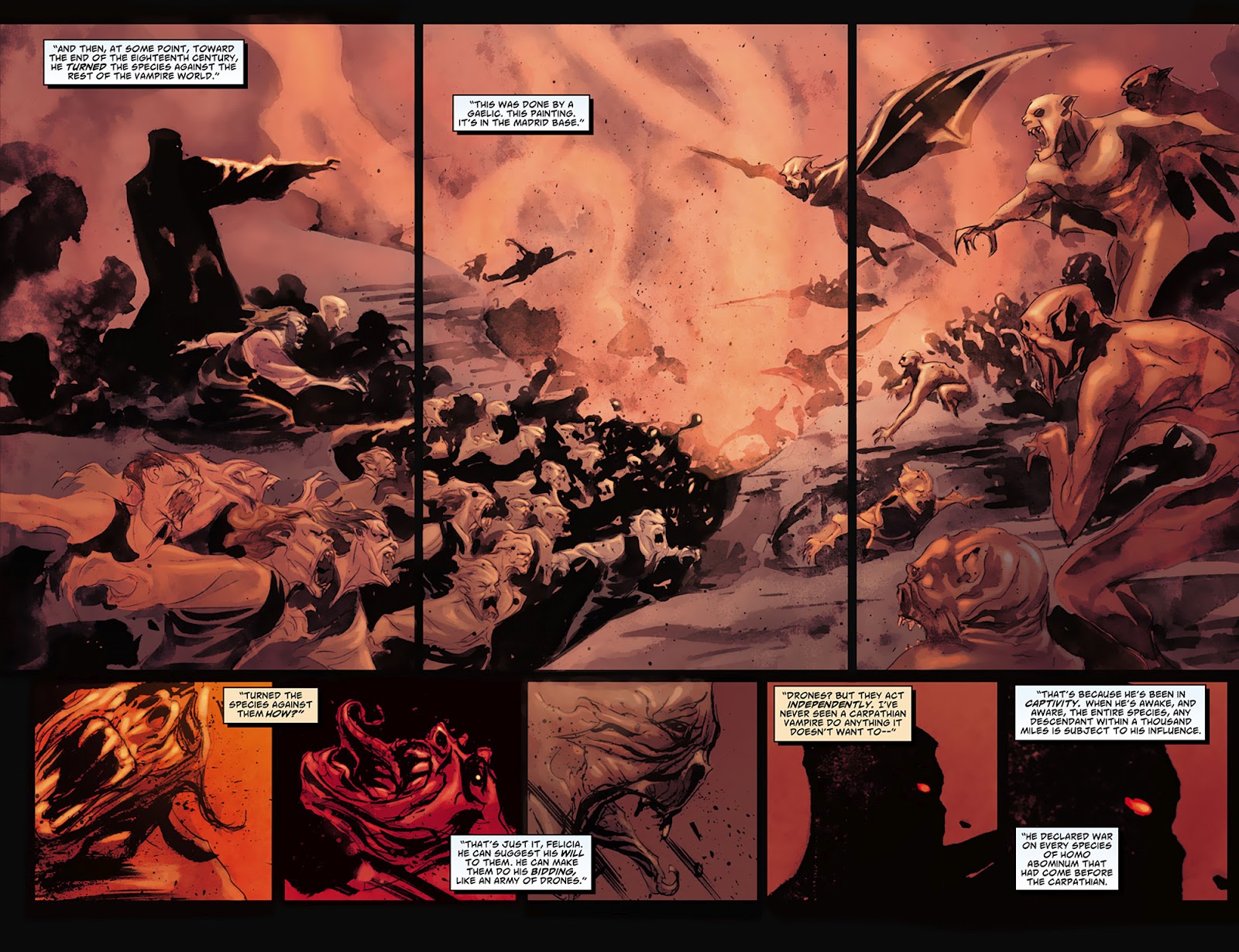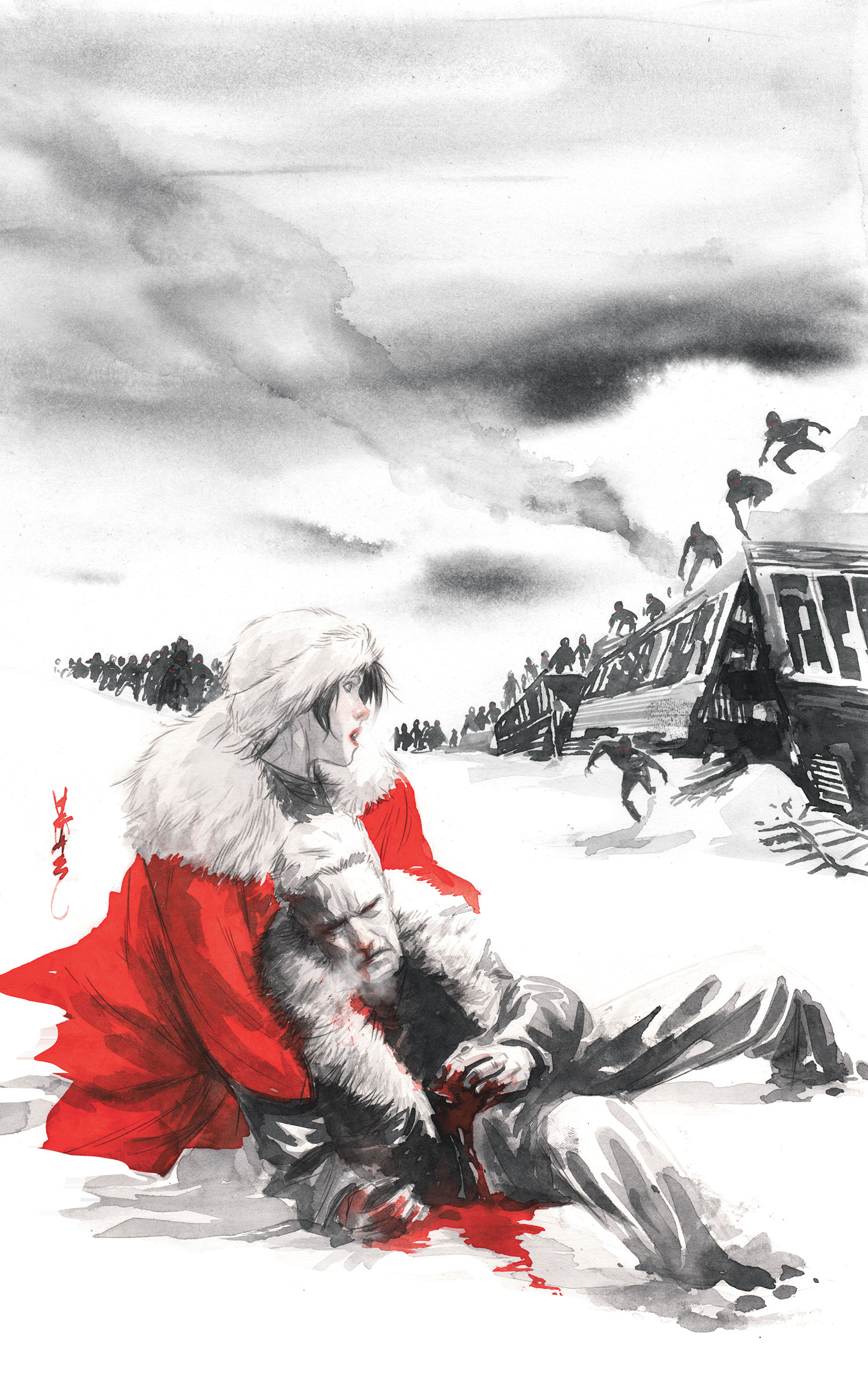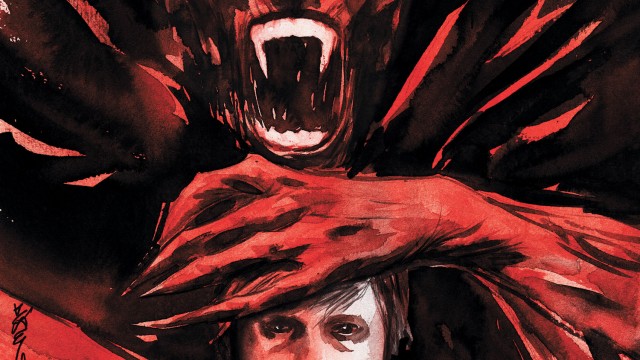The Avathoir/Wallflower American Vampire Conversation
Installment 8: The Bird of Hermes
Warning: this Conversation contains spoilers.
Avathoir:
In the sea without lees
Standeth the bird of Hermes
Eating his wings variable
And maketh himself yet full stable
When all his feathers be from him gone
He standeth still here as a stone
Here is now both white and red
And all so the stone to quicken the dead
All and some without fable
Both hard and soft and malleable
Understand now well and right
And thank you God of this sight
The bird of Hermes is my name
Eating my wings to make me tame.
–The Ripley Scroll, author unknown

Avathoir: So now we’ve done it. We’ve entered volume five (thunder crackles and booms loudly, shaking the foundation). Only three major stories to go before we head into the Second Cycle (which we’re covering) so now it’s time to talk about this story. This fucking story. I’ll be honest with you all, the first time I read this I was actually screaming in terror. It was in public. I was mortified. But it was JUST THAT SCARY. Snyder has, throughout this comic, covered a lot of different genres from western to mystery to thriller to exploitation. Now we’re venturing back into horror, which makes its first appearance after the Pacific Theater arc. Unlike that one though, which took full cues from Ridley Scott and James Cameron’s treatment of the Xenomorphs, Snyder is venturing into Lovecraft territory with the long delayed appearance of…DRACULA!
Wallflower, given Dracula’s ubiquity across pop culture, from Bela Lugosi to Kim Newman’s Anno Dracula to Hellsing to other things I forgot to mention: what makes this depiction of Dracula stand out to you, among other things? How do you find Snyder when he’s working in full “I’’m gonna scare the shit out of you and I’m going to love doing it” mode? What implications does this arc raise for you, given the four previous volumes we’ve dug our teeth into?
wallflower: He always has to show up, doesn’t he? Although this isn’t my favorite modern iteration of Drac (Buffy has that, especially when Xander gets all Renfelded), Snyder and artist Dustin Nguyen absorb this story well into the American Vampire universe. Here, Dracula isn’t a separate character but the most dangerous of the Carpathian breed of vampires (“Carpathian Prime”), and one more challenge for the Vassals of the Morning Star to take on. I like that; as in Buffy, the best modern Dracula stories aren’t about Drac himself but about those who pursue him, and those he controls. Bringing him in, though, creates a big problem for this volume that I’ll get out of the way right now: this is an almost unacceptably exposition-heavy volume, because there’s so much backstory on so many characters to fill in. It moves the least of all American Vampire stories, and that’s a bit of a shock after “Death Race.”
Back to what works: you’re right that this is some good, old-school Lovecraftian horror. Nguyen uses a wonderful style here, with shadows and flat, unlined surfaces, and a careful control of light values, with some pages taking place in stark white snow and much of the last issue happening at night. If David Fincher drew a comic, it would probably come out looking like this. The look he gives the story’ Renfeld, Tommy Glass, blond and small-eyed, has an Omen-like horror vibe; dude always has a smile and a sweater and it’s chilling It’s as beautiful and Gothic as horror should be, and it’s more effective than the action and gore.
What landed best about the story was the sense of transition, something that unifies this particular volume. More on this in the next installment, but here, it’s partly in the story of Gus, Felicia’s devamped son–or so we thought. He’s not fully human, though, plagued with nightmares and susceptible to Dracula’s control, and in the final beat of action, he goes full vamp and takes out Glass. (Hobbes dies in the same battle.) At the end, Felicia decides to tell him about his heritage, and the VMS realizes “that this war, it’s not against vampires anymore, it’s against evil.” All through the series, there’s been the need partially for people but mostly for vampires, to accept what they are and live with it. There’s a powerful sense here of one generation of stories coming to a close, and the newest generation accepting what it is. Neither is easy, which is to say both of them are dramatic.
For me, then, this is a better story in the VMS saga than it is in the Dracula pantheon. Since it clearly scared the crap outta you, what worked? What are the scary beats, and how does this fit into the universe of horror?
Avathoir: I think what makes this work is that Dracula, first and foremost, has absolutely no interest whatsoever in following the rules of this narrative (Snyder has also said in interviews that Dracula is not dead, he’s just stuck at the bottom of the darkest sea on earth. Doubtless he’ll show up again). Hobbes’ explanation of the history of Dracula, while you are right is exposition heavy, is terrifying precisely because of how much Snyder leaves out. The VMS are scientists just as much as they are fearless vampire killers: they classify, they categorize, and they figure out how to kill the shit out of whatever breed they come across.
Dracula’s mere existence throws all of that out the window. They don’t know where he came from. They don’t know what he’s thinking or how he thinks. They don’t understand how his powers work, really. Not once has any breed of vamp in this story shown to do anything remotely like what Dracula can do. Which of course leads to the realization that Dracula isn’t a vampire: he’s a queen termite, and every single Carpathian is one of his drones, completely subservient to his will (plus on Renfield), and there is no insect more damaging to the world then the termite. Any dude who can make a guy swallow a rat whole and then vomit it back up is someone worthy of my terror (that was the part that made me actively scream, by the way).
It also brings up another aspect of Dracula that’s scary here: the entire story we’ve seen the whole idea of vampiredom being seen as something like a chronic illness, something they have to “live with”, that it’s a curse. The ones who embrace vampirism aren’t actively “embracing” vampirism so much as using vampire attributes to exaggerate their human selves. Skinner was always a bastard. Hattie was always a backstabber.
Dracula is different, he embraces being a vampire. There is no human in him, and Nguyen wisely chooses to make him a silhouette instead of show him looking like Count Orlok or anything like that. He’s just as much a voice in the night as he is a living creature, and he has a powerful persuasion, as we see with Hobbes.
Which brings me to ask you: now that Hobbes is Most Sincerely Dead, what did you think about him? I know he and the VMS have been a recurring aspect of the series you’ve been drawn to, their Knights Templar tendencies combined with sweet, magical science, and Hobbes, with his strategizing and manipulations, tends to work as the embodiment of the organization perfectly. So now that you know his whole story, and his story has ended, what did you think of him? Did his character arc work for you? Do you have more respect for the guy instead of suspicion? Are you even MORE conflicted? Do tell.

wallflower: Oh, Hobbes, a company man to the last–and I mean that as a positive thing. You’re right, I’m always drawn to institutions and stories about them. American stories glorify the individual and almost always set individualism against institutionalism, but individuals die and institutions live on. Hobbes was always at his best when he was making the calculations all institutional managers have to make–how much good can I do? What and who do I have to sacrifice to achieve that good? That he was taking the VMS in a new direction suggests that he was good at that and that he was a moral man in the world of the VMS. In the end he died in service to them, and I’m cool with that. (Let it be noted, though, that I was dead wrong on Hobbes being immortal.)
Hobbes’ loyalty to the VMS made his backstory with Dracula tricky. I’m not sure if it was necessary; I don’t think being part of an anti-vamp organization needs to be explained. On the other hand, it is a nice touch that Hobbes’ encounter with one immortal (Drac) sends him towards another immortal (the VMS). If it comes across as an overdone character motivation, it fits in well with the symbolic universe of American Vampire. In the next installment, we’re going to get into this question of what passes and what lives on, and Dracula and VMS both live on.
So do families, and that’s another story here that clicks forward. At the end, Felicia truly makes Gus part of her family; the last line is “I want to tell you a few things about your Dad.” Part of what defines family is the stories they tell to themselves, and she’ll tell Gus the story of his heritage. From the beginning, Snyder has dared to play on the broadest historical stage, with vampires, institutions, and families that go through generations. (This is something he shares with some authors you mention in our next installment.) I’m curious to see where the VMS goes next, but even more curious about Gus.

Avathoir: Felicia’s an interesting case here. When we last saw her she’d just escaped with Gus, embarking on the first time her own personal narrative. We catch up with her, having hardly aged (a likely result of her parentage) and a caretaker to young Gus. That’s a pretty big damn shift from last time we saw her, when she had been born and trained to be the ultimate VMS agent and now decided that she wasn’t going to be like that anymore. But Felicia’s main struggle has always been whether to be a symbol, a piece of an organization, or an individual. Is she Felicia, or is she the “Chosen One” (which we STILL don’t know what that means). At the end of the arc Hobbes appoints her his successor, but in a way she’s also condemned her to continue this struggle, and time will tell if she can overcome it.
But you’re right about how she makes Gus a part of her family in this arc. Before this arc, we see her walking with Gus and despite her obvious care and affection (and even calling him her son) but she treats him with a distance, hiding things from him until the shit hits the fan, and even then trying to protect him. Oddly enough, it isn’t until she fails and Gus finally shows he’s not fully human or vampire that she truly becomes his mother. There are no more secrets, no more shields. It’s time to face the music together as a family. The only other thing is that it makes her relationship with Cash a bit more complicated. They did kiss, but exactly how much she thinks of him as the other parent is a bit muddled to me. I suppose I’m missing the point, though.
Now, before we wrap this up, I have a few questions I’d like to ask you in light of this arc: Why do you suppose Snyder spared Dracula, denying Hobbes the chance for full redemption and keeping him as a threat? What does Felicia’s new job entail for her and her future? Now that the VMS has changed goals…what will happen to it? Can it really sustain itself just fighting against “Evil”? What on earth can we expect from the Soviets after the events of this arc? Was Charlie Wilson right to say never trust the Russians?

wallflower: Going back to the discussion about institutions, Felicia is most definitely not a company woman. There’s potential there for some good drama, as she’s an outsider who will have to adjust to being the farthest inside, somewhat like the Wolfram and Hart storyline in Angel’s final season. Expanding out to the entire VMS, they’ll have to work on staying focused here; we’ve seen, throughout history, that dedicating yourself to a fight against evil is a good way to go corrupt. Being against bad doesn’t make you good. I would be quite happy to see a volume on the origins and history of the VMS, right down to the departmental squabbles and arguments over stationery.
Felicia inherits now the position of Pearl, and her dilemma too: where are your loyalties? She’ll have more responsibilities than Pearl and a global stage on which to play. (Coming soon: Multinational VampireCorp!) If the VMS goes forward into a greater partnership with vamps, how will Pearl react to this? Through so much of American Vampire, we see the theme that you can ally with vampires but never control them (and that comes back in the next installment, big-time); I suspect Felicia knows this more than anyone. So how will she play it? And, something that we haven’t really seen yet: to what extent will her biological heritage, her bloodline through the vamped Jim Book, make a difference?
As to sparing Dracula, well, if you’re writing a saga with Vampire in the title, you don’t let go of him that easily. Clearly there’s more storytelling value to be extracted here. From a less mercenary standpoint, it makes sense too. As we’ll talk about in the next installment, American Vampire is best suited for ongoing stories (appropriately enough, it’s like The Walking Dead that way), and for that, you need ongoing threats. “What you’re saying is, they’re just plain evil,” Felicia sez of the Carpathians, and evil doesn’t just go away because you sink it to the ocean floor.


